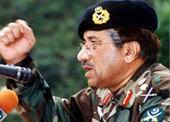Musharraf: Kashmir is the core issue
Musharraf’s policies on Kashmir are seen as “extremely rigid” – a marked difference from previous civilian governments.
In October 2002, Pakistan held its first national and provincial elections since General Pervez Musharraf took over the country in a bloodless coup three years earlier.
That ballot was another attempt by Musharraf, who named himself president in June 2001, to legitimise his hold on power for at least the next five years. The elections brought in a new prime minister, government and parliament – but they remain subordinate to the military leadership of Musharraf.
|
|
|
Musharraf: firmly in |
“He legitimised the result of the coup, and the referendum that followed in April 2002, and has gotten away with it,” wrote Zia Mian, scholar on South Asian and disarmament issues at the Center for Science and Global Security at Princeton University.
“Second, he has created a new political formation in Pakistan, a structure that is loyal to him and dependent on the military, with less autonomy and less capacity to represent any interests other than the military.”
Musharraf has given himself wide-ranging powers by amending the country’s constitution – like the ability to dismiss parliament and elected governments – moves criticised by opposition parties.
“Musharraf is in control but he lacks political support which forces him to juggle his policies,” Ambassador Hussein Haqqani of the Carnegie Endowment for International Peace told Al Jazeera. “He has to make short-term accomodations with various powerful political lobbies, including the Islamists. His dependence on the military is extensive though right now he has no focused opponent who could oust or challenge him.”
American ally
After initially giving him a lukewarm reception, Western powers warmed to Musharraf after September 11 when he decided to cooperate with Washington in its so-called war on terror.
Pakistan received hundreds of millions of dollars this year in US economic aid after US President George W. Bush renewed a waiver of sanctions placed on Islamabad after Musharaf seized power in 1999.
In a memorandum to the secretary of state, Bush said the waiver would facilitate Pakistan’s transition to democratic rule and was important to US efforts “to respond to, deter, or prevent acts of international terrorism.”
Under immense international pressure, he began a nationwide crackdown on Islamist groups in January 2002, outlawing several and arresting and detaining thousands of supporters.
India however continues to accuse Pakistan of supporting “cross-border terrorism” by arming, funding and sending fighters into Indian-administered Kashmir to join an uprising against New Delhi’s rule there.
Islamabad denies the charges but proclaims “moral support of their freedom movement.”
“Pakistan rejects and condemns terrorism in all its forms and manifestations. Pakistan will not allow its territory to be used for terrorist activity anywhere in the world. No organisation will be allowed to indulge in terrorism in the name of Kashmir,” Musharraf said in January 2002.
Kashmir question
“The military government, despite its denials, has continued its proxy war in Kashmir as part of a broader strategy to make the costs of controlling the territory untenable for India,” the International Crisis Group, a non-profit research organisation, said.
Observers believe Musharraf’s policy on the disputed region of Kashmir is extremely rigid. “His policy is different from his predecessors in the sense that he refuses to discuss any other issue with India unless Kashmir is discussed first,” Jassim Taqui, an Islamabad-based political analyst told Al Jazeera.
“This stance has not been taken by any other civilian government in the past. Musharraf does not want to discuss normalisation of relations with India like trade or economic ties or start any dialogue unless Kashmir is the core subject.”
Haqqani, who served as adviser to former Indian Prime Minister Nawaz Sharif agreed.
“Musharraf is uncompromising on Kashmir and very hardline against India. He could have built a consensus inside Pakistan for accommodation with India but opted for a two-track policy of covert support for Kashmiri militants while publicly seeking dialogue.”
Sharif, he explained, rose to power by voicing a hardline stance on Kashmir. “But he also started a peace process with India, manifested in Prime Minister Atal Bahare Vajpayee’s visit to Lahore in 1998.”
Future
That peace process never moved forward. “Musharraf (who was chief of army staff at the time) sabotaged the peace process by initiating the Kargil war of 1999,” Taqui said.
Ever since, the Kashmir dispute has failed to make much headway with India downgrading diplomatic relations with Pakistan when Musharraf took power. Musharraf himself held summit talks with Vaypayee in Agra in July 2001. But that was a failure with both sides agreeing only to hold another meeting.
“Being a muhajir – or a refugee from India – Musharraf is expected to be closer to India than Pakistan. But it is the opposite,” Taqui explained. ‘I think the Pakistani president believes that India only knows tough language. He is dealing with an ultra-right government in India which is also rigid in dealing with Islamabad and the Kashmir issue.”
Both governments have recently expressed their willingness to talk immediately.
But New Delhi has made that dialogue conditional on Islamabad “ending its support for militants” that the Pakistani authorities deny providing.
